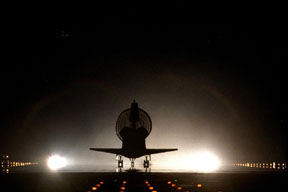The space shuttle Discovery landed during the early hours of June 6, 1999.
Click on image for full size
Courtesy of NASA
Discovery Landed, Columbia Launch in Question
News story originally written on June 7, 1999
The space shuttle Discovery made a successful landing during the early hours of June 6, 1999. The night landing was only the 11th of its kind in 94 flights. The highlights of the mission include attaching construction cranes on the International Space Station (ISS) and delivering supplies that will be used by the station's first crew, scheduled to be aboard next March.
Most of the attention, however, is focused on the next scheduled mission. The shuttle Columbia is supposed to launch on July 22, 1999. It's payload is an X-ray observatory similar to the Hubble Space Telescope. The observatory is supposed to be propelled into its orbit by a motor. During an earlier mission, a similar motor failed to work, stranding a satellite in space.
The launch will not take place until the cause of the motor failure is found. If the shuttle doesn't launch by August, it will have to re-schedule for next year.
If Columbia does not complete its mission by August, it will most likely make a trip to California for an overhaul. The earliest it would be able to begin a mission is the fall of 2000. Unfortunately, Columbia is the only shuttle with a cargo bay big enough to hold the observatory.
You might also be interested in:
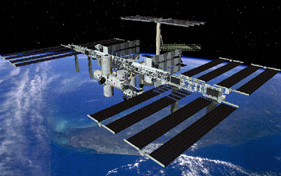
Well, the good news is that the first part of the International Space Station (ISS) is still on schedule for launch this November. The second U.S.-built module named Unity will launch in December. Ready
...more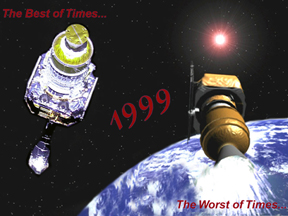
It was another exciting and frustrating year for the space science program. It seemed that every step forward led to one backwards. Either way, NASA led the way to a great century of discovery. Unfortunately,
...more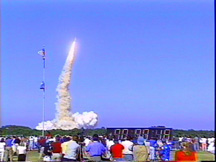
The Space Shuttle Discovery lifted off from Kennedy Space Center on October 29th at 2:19 p.m. EST. The weather was great as Discovery took 8 1/2 minutes to reach orbit. This was the United States' 123rd
...more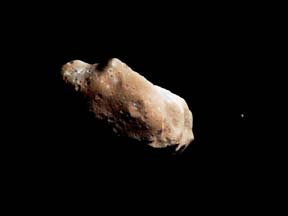
A moon was discovered orbiting the asteroid, Eugenia. This is only the second time in history that a satellite has been seen circling an asteroid. A special mirror allowed scientists to find the moon
...more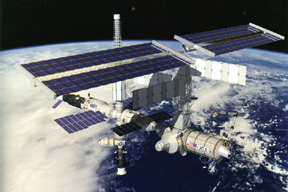
Will Russia ever put the service module for the International Space Station in space? NASA officials want an answer from the Russian government. The necessary service module is currently waiting to be
...more
A coronal mass ejection (CME) happened on the Sun early last month. The material that was thrown out from this explosion passed the ACE spacecraft. The SWICS instrument on ACE has produced a new and very
...more
J.S. Maini of the Canadian Forest Service called forests the "heart and lungs of the world." This is because forests filter air and water pollution, absorb carbon dioxide, release oxygen, and maintain
...more


